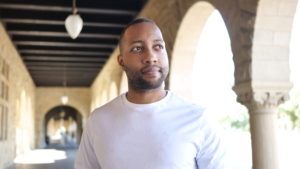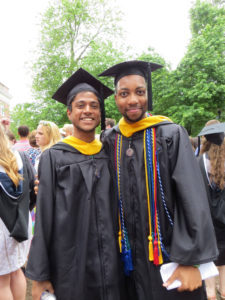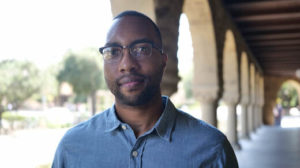The Mayor of Mary Washington. That’s what one professor called then-student Lavar Edmonds ’14 as he strolled down Campus Walk, stopping to chat with everyone along the way.

“I’ve always been a curious person,” said Edmonds, who discovered a passion for social science research at the University of Mary Washington. Majoring in economics was “a whole new way to ask and answer my own questions about the world, which is a huge part of what I do now.”
A Ph.D. candidate at Stanford University, Edmonds engages in conversations with his students like he did with his professors a decade ago, describing his time at UMW as “an unparalleled experience.” He’s still asking important questions, such as how economic and housing inequality can impact learning, recently as a research specialist at Princeton University’s Eviction Lab.
At the start of the pandemic, Edmonds penned a Washington Post opinion piece that asked: Want to help kids weather this school year? Keep them from getting evicted. His expertise drew national attention, landing him interviews on PBS Newshour and NPR.
Edmonds, who grew up in Norfolk, Virginia, in a family of educators, always expected to teach. What he didn’t foresee? How economics figured into the equation.
“Education is a huge enterprise, and in most state budgets, it’s the largest expenditure,” said Edmonds, who got interested in the field after taking an elective on the principles of microeconomics. “Everyone is touched by teaching, which has a tremendous social, cultural and economic impact on our society.”
At Mary Washington, Edmonds said, he found “the kind of college experience every student should have,” forming meaningful bonds with professors who “not only do research, but teach, advise, mentor and make themselves available to students.”

Outside of class, Edmonds played violin with UMW Philharmonic and popular indie band Wylder. He also used critical-thinking and problem-solving skills he gained at Mary Washington as a data analyst for UMW’s Student Transition Program, collecting information on academic outcomes for first-in-family and underrepresented students.
“Lavar had tons of academic talent, but what stood out was his inquisitiveness,” Professor of Economics Robert Rycroft said. “He wanted to know the deep reasons why things worked the way they did, and he was willing to do the research to discover that.”
After graduation, Edmonds, who minored in math, taught precalculus in nearby King George County. Thinking about ways to improve student performance led him to pursue a master’s degree in education policy at the University of Pennsylvania.
Then, he moved on to Princeton, where he compiled eviction data to help policymakers, journalists, educators and others better understand the intersection of housing inequality, poverty and education. His Washington Post article, published in 2020, brought attention to a critical problem – at a time when people needed to stay home, a growing number were being forced out of theirs, unable to pay rent.
“If we care about keeping students safe, and if we care about educational equity, we need to find ways of keeping children home while still providing high-quality, easily accessible education,” Edmonds wrote. “That starts with making sure they have homes at all.”
His doctoral work asks a new question: How does having teachers trained at historically Black colleges and universities impact Black elementary school students?
There’s a lack of research in this area, said Edmonds, who hopes his data can help craft legislation that benefits schools, teachers, administrators and most of all, students. “I enjoy creating new knowledge and contributing to this conversation.”

He did just that earlier this month, when his Stanford research was shared in an article titled “Public School Students With Teachers Educated at HBCUs Do Better at Mathematics” by The Journal of Blacks in Higher Education.
All of his educational experiences shaped him as a scholar, Edmonds said, but his UMW professors provided a model for teaching and interacting with students. “Mary Washington influenced how I think about academia and the type of professor I want to be.”
Lavar Edmonds was the recipient of the Crawley Senior Fund, the Charles A. and Lenore Kramer Orchestra Scholarship and the James E. Baker University – Community Orchestra Scholarships.
Watch Edmonds in UMW’s 2019 College to Career video, where he revisits his alma mater and talks about his time as an undergraduate at Mary Washington.
Betty Emrey of Mindpower Inc. contributed to the reporting and writing of this story.